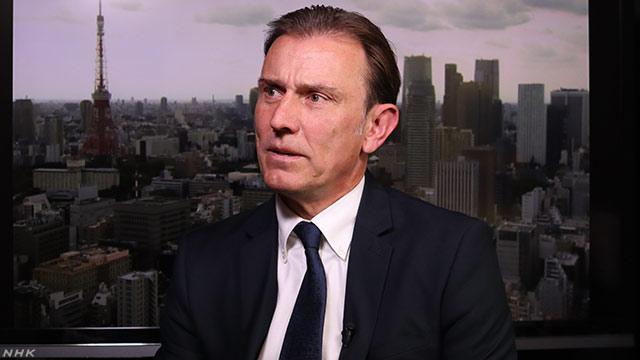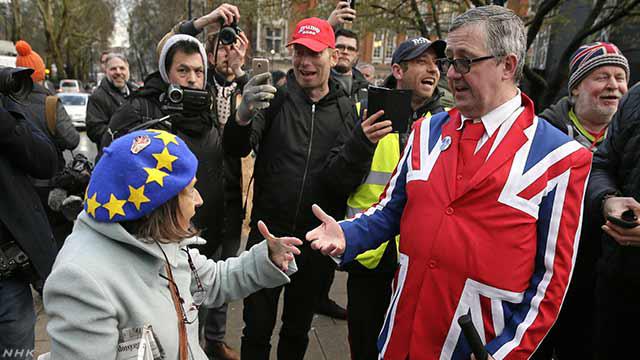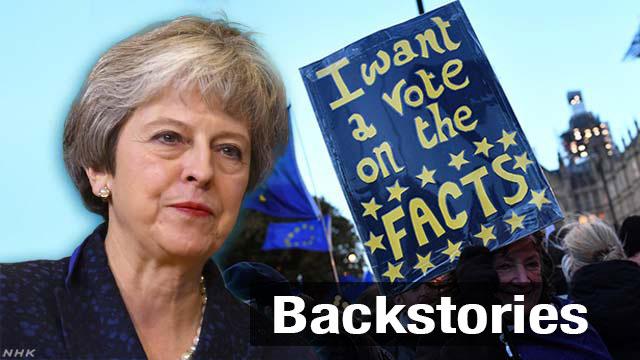Wingfield-Hayes:
"I think it's quite understandable that people in Japan are confused by what's going on in Britain, because I think people in Britain are very confused about what's going on. And the reason for that is the country is deeply, deeply divided over what they want to do. So if you ask, do the British people really want to leave the EU or do they want to stay, the answer is about half and half. The country really is divided right down the middle."
Wingfield-Hayes describes the situation as, “undoubtedly the most serious political crisis in Britain since the Second World War.”

The UK parliamentary system has been a model for many other political systems in the world, including Japan's. But critics say the current situation in the UK parliament shows that it no longer works.
Wingfield-Hayes:
"You hear people saying this is a crisis of British democracy. It shows the British parliamentary system is not working as it should do. Equally, there are many people who are saying, ‘hold on a second, Britain has gone through many, many political crises over the centuries and the British political system has evolved through those crises, and that actually what we've seen in the last few weeks is really that the British parliamentary system is actually working.’ I think you hear those voices in Britain as well."
Wingfield-Hayes says he sees that other countries want the UK to come to a decision.
"I think Britain's allies in Europe are extremely frustrated with this process and want it to be over, want Britain to come to a decision. Do you want to leave? And how do you want to leave? Or, do you want to change your mind and stay? They want Britain to make a decision.
Germany and France and Italy and all these other countries in Europe have their own problems, their own political agendas that they want to work on, and they don't want to continue being constantly distracted by this."
And he says it is a similar picture in Britain.
"The British Parliament has been unable to pass lots of important legislation because it is totally focused on the Brexit problem. So it's sort of legislative gridlock. Nothing's happening."

More than 1,000 Japanese firms are operating in the UK and an increasing number of them have decided to move to other European countries.
Wingfield-Hayes:
"I've spoken to business leaders here and to senior members of the Japanese government, who are all saying they are confused and they're concerned, and that Japanese businesses like operating in Britain and that it's very friendly, stable."
"I think it is something that British politicians worry about. British business leaders are very worried about not just Japanese leaving but other big international organizations leaving the UK. Clearly a lot of damage has already been done. Inward investment into the UK is at its lowest level in at least 10 years. Inward investment has been falling dramatically."
"Maybe the one bright spot, the one good thing that we've seen in the last few weeks is that it's clear that the British government and the British parliament do not, will not, allow the UK to leave the EU without a deal. And a deal looks like it means staying at least having free movement of goods between the EU and Britain.”
The EU was originally conceived as an economic union that would help make Europe a peaceful, prosperous region. This idea was embraced by the generation growing up after WW2. But later generations, with no memory of the war, tend to see the EU as a big, bureaucratic, wasteful institution.
"The last ten years has been a very hard time for a lot of people. They've seen their wages stagnate, they've seen benefits cut. And at the same time they see the super-rich in London, people who have phenomenal amounts of money."
"I think there's a lot of anger and resentment but I don't think it's unique to the UK. I think you see this across Europe. You see it in America, you see it here in Japan. So this is a global phenomenon and it's sort of played out in different ways. You can say in the United States it has played out through the election of Donald Trump. In the UK it has played out through the Brexit referendum, in France it's now the yellow vests, in Hungary it's the election of a right-wing government, so all over the world you're seeing that. Angry people trying to take some sort of vengeance.”
Prime Minister May has told UK lawmakers they need to fulfill their duty to the nation and approve the country's exit from the EU. She has said that she wants the UK to leave the EU “as soon as possible.”
Some pro-Brexit lawmakers in her party are demanding that she resign, while the opposition parties want another referendum. The EU has granted a short reprieve: the question is whether May, or anyone else, can find a solution in that time.

